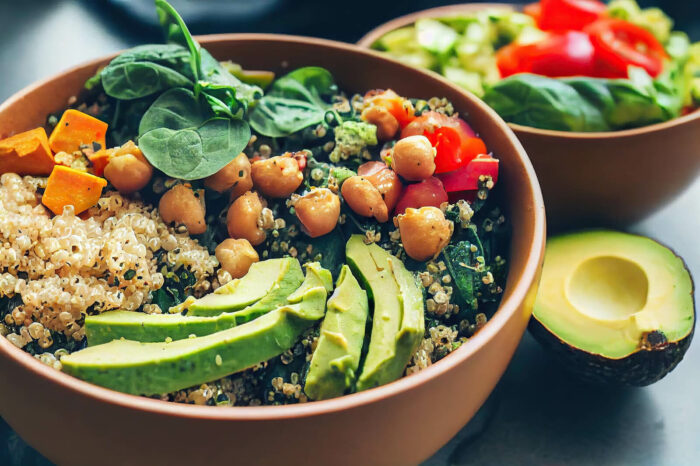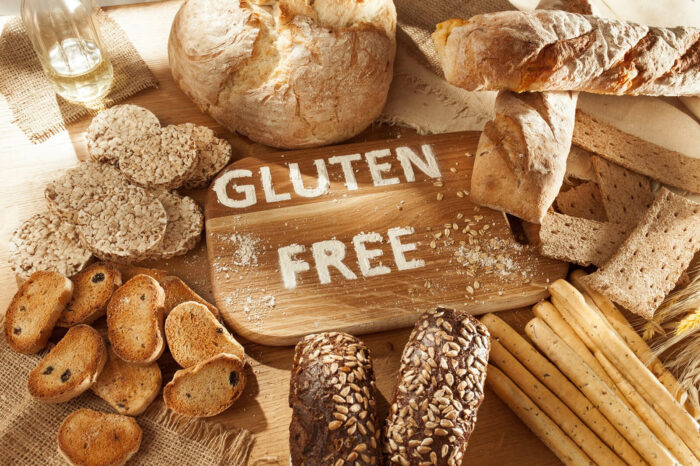4 Types of Vegans and 8 Types of Vegan Diets
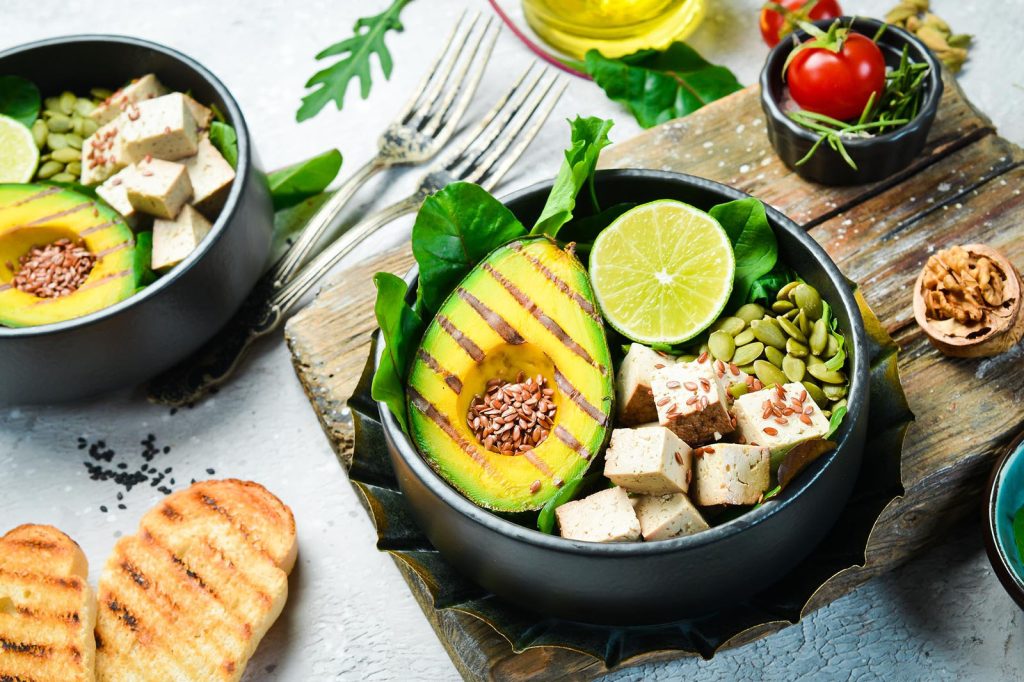
Vegans are people who remove all animal products from their diet and lifestyle. As such, they will not consume meat, fish, eggs, dairy products, or any other items originating from animals. The umbrella term of veganism incorporates several different types of vegans: health vegans, ethical vegans, environmental vegans, and raw food vegans.
Benefits of a Vegan Diet
Turning to a vegan diet can have great benefits to your health, as well as the environment. Plant-based foods are naturally rich in vitamins, minerals, and dietary fiber, which helps with digestion. Eating this way can reduce risk of heart disease, certain cancers, diabetes, and high blood pressure. Eating a diet focused on plants can also reduce inflammation in the body which can lead to improved mental clarity and energy levels.
Environmentally speaking, transitioning from non-veganism to veganism could be one of the most beneficial long-term ways people contribute to saving our planet. With fewer resources used for animal production as opposed to crops for human consumption, we can significantly reduce deforestation and climate change effects such as emissions of greenhouse gases.
Different Reasons for Vegan Diets
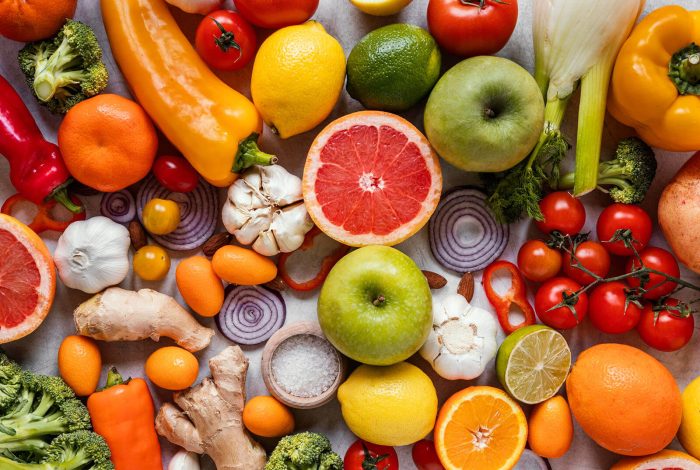
While there are many different types of vegans and their purpose for going vegan, there are also many different reasons why someone might choose to follow a vegan diet plan. Health vegans concentrate on the nutritional advantages of a plant-based diet, while ethical vegans prevent animal products for ethical factors. Environmental vegans strive to lower their ecological footprint by avoiding animal items and supporting sustainable farming practices. Raw food vegans emphasize eating unprocessed and uncooked foods whenever possible in order to protect vital vitamins and minerals.
Lastly, some individuals may choose to follow a vegan diet for religious or spiritual reasons, such as Jainism which restricts the intake of any living animal. We’re going go through all the different reasons and give you the definition of each.
Ethical Vegans
Ethical vegans are people who have chosen to abstain from consuming animal products for ethical reasons. Most often, ethical vegans adopt a vegan diet due to moral or environmental concerns such as animal rights and exploitation, health and welfare issues, world hunger, or the protection of the environment. Ethical vegans strive to reduce their consumption of animal products and make conscious decisions when selecting food and other consumer goods that are cruelty free. Their commitment to animal justice extends beyond nutrition by respecting all sentient beings within the culture in which they live.
Veganism is so much more than simply what someone puts on their plate; it transcends into many aspects of everyday life – from fashion choices to cleaning supplies. Through their stance on animal advocacy and living an ethical lifestyle, ethical vegans help bring attention to the injustices inflicted upon animals every day.
Environmental Vegans
Environmental vegans are those who follow a vegan way of life in order to lower their ecological footprint. They refuse to eat animal items such as meat, dairy, eggs, and honey in order to lower the demand for these items and help protect the environment. Ecological vegans likewise strive to support sustainable farming practices such as natural agriculture and permaculture. They might get involved in advocacy such as protests and boycotts in order to bring attention to ecological issues.
Environmental vegans have been leading a more conscious lifestyle that has caught the attention of the world. This new mindset encourages people to think beyond their plate and consider the effects of food production on our environment. By choosing vegan products, individuals are able to reduce their consumption of resources such as water, land and energy which can have an ecological benefit worldwide. An environmental vegan diet is not only centered around avoiding animal products but also focuses on eating locally sourced and sustainable plant-based foods. Shopping at farmer’s markets and using organic ingredients in recipes help individuals reduce their footprint even further when sustaining a vegan diet.
Health Vegans
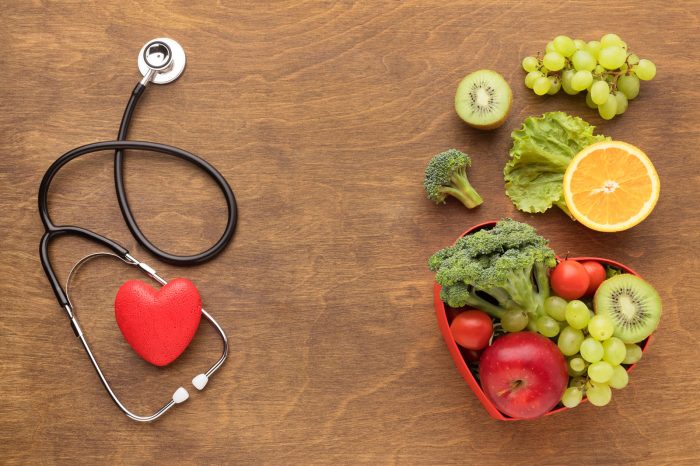
Health vegans are those who follow a vegan lifestyle for the health advantages connected with a plant-based diet. They eat nutrient-dense meals, entire plant foods such as veggies, fruits, nuts, seeds, vegetables, and grains in order to get an abundance of vitamins and minerals while also getting protein from these sources as well. The increased consumption of fiber associated with a vegan diet plan can assist lower cholesterol levels, lower the danger of heart problems and improve food digestion. Additionally, a research study has actually revealed that vegans tend to have a much lower BMI (Body Mass Index) than those who take in animal items.
Eating a plant-based diet has many benefits, and a growing number of people are embracing the vegan lifestyle to stay healthy. Health vegans often report feeling more energized and an overall improved sense of well-being due to the consumption of whole foods and fewer processed ingredients. While health vegans may consume all kinds of vegan foods, they tend to focus on nutrient-rich fruits, vegetables, nuts and seeds that help support their bodies and promote general health.
High intake of antioxidants found in fruits like goji berries and vegetables such as spinach help provide additional energy for physical activity as well as essential nutrients for overall bodily health. Health vegans recognize that whole food plant-based diets are often superior than those including animal products in regards to improving general health; with thoughtful meal planning it is easy to satisfy nutritional needs from a variety of vegan sources.
Religious Vegans
Religious vegans are a unique sub-group of the vegan population. Unlike their more secular-minded counterparts, religious vegans are motivated by faith and scripture to lead a lifestyle devoid of animal products. The decision for many religious vegans is not an easy one; it often means sacrificing foods which have been part of traditional diets for generations. Despite the challenges, religious vegans have started to form communities where they can share tips and support each other in their vegan journey. It’s a testament to their convictions that many persevere despite the potential costs, proving that religion does indeed play a role in instilling compassion for living creatures big and small.
Jainism is an ancient Indian faith that restricts the usage of any living creature and as such, Jains are generally vegan. Other beliefs and religions such as Buddhism and Hinduism also encourage thoughtful treatment of animals and might prevent the intake of animal products. In addition, some individuals may pick to follow a vegan way of life for spiritual factors in order to live a more serene and harmonious life.
Types of Vegan Diets
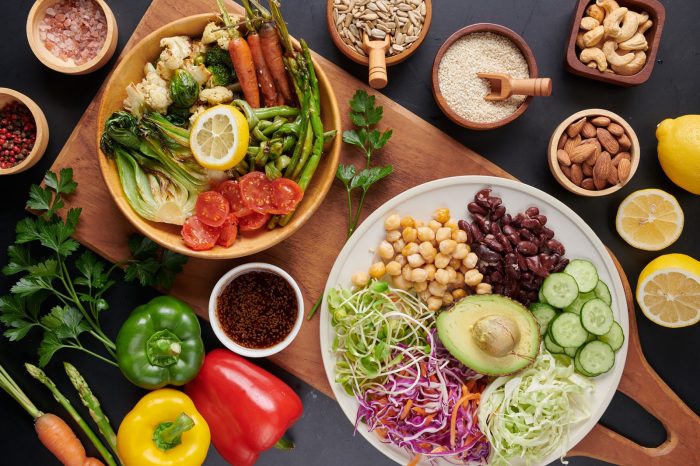
Now that we’ve gone over the different types of vegans, we’re going to go over the different types of vegan diets and meal plans. There are numerous kinds of vegan diet plans, depending on an individual’s dietary needs and choices. Some vegans may choose to follow plant-based diets which stresses consuming unprocessed, nutrient-dense foods such as veggies, fruits, nuts, grains, vegetables, and seeds.
Other vegans might choose to concentrate on raw veganism which highlights eating raw and unprocessed foods whenever possible. In addition, some vegans might select to follow a macrobiotic diet which concentrates on taking in organic whole grains and seasonal veggies while avoiding animal products. We’ll go in depth with some of the vegan diets below and specific meal plans.
Whole-Food Vegan Diet
A whole-food vegan diet is among one of the most popular approaches to vegan eating. This balanced and nutritionally complete way of eating includes whole plant-based foods such as fruits, vegetables, whole grains, legumes, nuts, and seeds. Allowing a variety of healthy plant proteins from different sources ensures your body gets all the vitamins and minerals it needs while eliminating animal products from your diet.
Opting for this type of diet allows vegans to fill their plate with unrefined carbohydrates and fats from different fat sources that are packed with nutritional benefits rather than those filled with saturated fats and processed forms of sugar on a regular basis.
Plant-Based Diet
Eating a plant-based diet has become increasingly popular in recent years and for good reason! Eating more vegetables, fruits, and other fiber-rich plants has many benefits for both the body and the environment. Replacing processed foods with whole food sources can reduce cholesterol levels, blood pressure, inflammation, and risk of chronic diseases like diabetes.
Not to mention its positive impact on the planet – a plant-based diet requires fewer resources than diets that include animal products since plants need less land, water, and energy to produce. Plant-based meals can also be incredibly tasty while still providing your body with proper nutrition!
Raw Vegan Diet
The Raw Vegans Diet is a type of vegan diet that highlights consuming unprocessed and uncooked foods whenever possible in order to maintain vital minerals and vitamins. This kind of vegan diet plan focuses on consuming raw fruits, vegetables, nuts, seeds, and sprouts as the primary sources of nutrition. Additionally, some cooked foods such as steamed veggies or gently prepared grains might likewise be included in this diet plan. Fermented foods such as kimchi or sauerkraut can be consumed in order to get probiotics for gut health.
The Raw Vegan Diet is useful for those aiming to improve their total health and wellness while likewise protecting important vitamins and minerals found in food.
High-Carb Low-Fat Vegan Diet
The High-Carb Low-Fat Diet is a type of vegan diet that emphasizes consuming carbs from entire, unprocessed plant foods such as veggies, fruits, seeds, nuts, and grains. This type of vegan diet plan is low in fat and highlights eating intricate carbohydrates while preventing processed foods and animal items. Additionally, HCLF diet can help in reducing the danger of heart problems, diabetes, and specific types of cancer while also promoting weight loss.
Research study has shown that people who follow a high carb low fat vegan diet tend to have lower BMI (Body Mass Index) than those who consume animal items. This kind of vegan diet can be helpful for those seeking to enhance their general health and wellness while likewise taking in an adequate quantity of carbs.
Gluten-Free Vegan Diet
The Gluten-Free Vegan Diet is a type of vegan diet that removes all foods including gluten, which is a protein discovered in rye, wheat, and barley. In addition, this type of vegan diet plan can help reduce the danger of heart illness, diabetes, and specific types of cancer while likewise promoting weight loss.
A gluten-free vegan diet offers many advantages for those looking to lead a healthier lifestyle. It eliminates animal products, as well as foods containing gluten, and instead encourages healthy plant-based foods that are often organic, unprocessed, and full of vitamins and minerals. This type of diet is not only more beneficial for your body than normal eating habits, but it can also result in more energy throughout the day. Best of all, it eliminates the need to track calories, which makes sticking to a balanced diet much easier.
Gluten-free veganism may appear restrictive at first glance; however, with some creativity and knowledge base on the right ingredients it can be a truly delicious and nutritious lifestyle choice.
Oil-Free Vegan Diet
The Oil-Free Vegan Diet is a type of vegan diet plan that eliminates all oils, including vegetable and seed oils. Eating an oil-free vegan diet can be a healthy and delicious way of eating that focuses on whole plant-based food sources. As a person following this type of diet, you would get your proteins, carbohydrates, vitamins, minerals, and other nutrients from non-animal sources such as legumes, nuts and seeds, grains, fruits and vegetables.
High in fiber-rich foods and low in both processed foods and saturated fats, this type of diet can help prevent diseases such as diabetes and heart disease. Non-dairy plant-based milks and cheeses can also be great for adding variety to savory dishes or desserts. With no shortage of meal options available to eaters of all stripes, anyone looking towards improving their overall health could certainly consider the possibilities of eating an oil-free vegan diet.
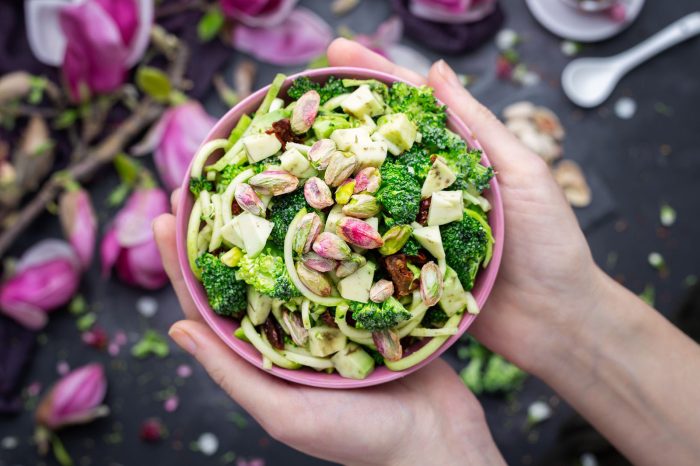
Pegan Diet
The Pegan Diet is a vegan diet plan that blends principles from both the Paleo and Vegan diets. Combining aspects of these two plans can help lower the risk of developing health or lifestyle conditions such as diabetes, heart disease, and certain types of cancer. Additionally, it can also promote a healthy weight loss journey. A bonus to this type of diet is that it excludes dairy and most processed foods, making for easy-to-follow meal guidelines. Just remember to stick to plant-based proteins, healthy fats, and low glycemic fruits and vegetables to ensure your body receives all the vital nutrients it needs.
Vegan Ketogenic Diet
The vegan ketogenic diet is a plant-based dietary program that involves minimizing carbohydrate intake while simultaneously increasing healthy fats in one’s diet. Relying heavily on high-fat, low-carbohydrate foods such as avocados, nuts, and coconut oil – this diet has become increasingly popular among vegans as it retains essential nutrients while allowing its followers to stay on their chosen path.
By eliminating the need for animal-based protein sources through careful planning and incorporating strategic plant sources of fat, protein, and fiber – this plan provides an effective way of maintaining a healthy lifestyle without the need for animal products. While requiring diligence at first, the vegan ketogenic diet is certainly worth considering for those people who wish to pursue a healthier lifestyle without compromising their ethical or moral convictions.
